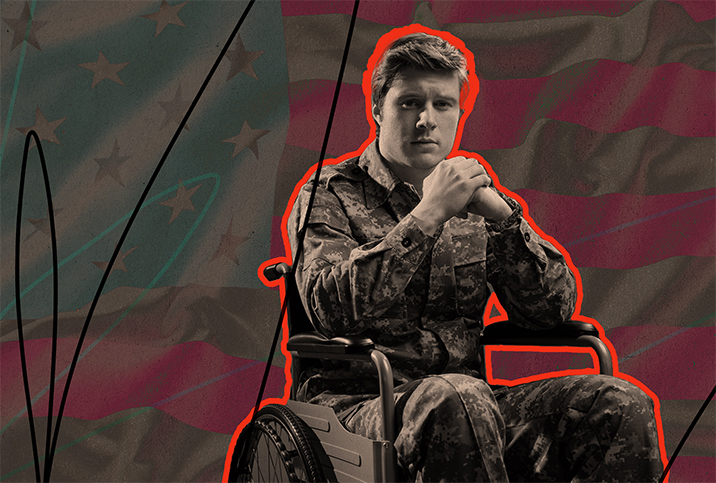How Do You Manage Your Health When Your Spouse Is Deployed?

As an active duty soldier or officer, being deployed in any branch of the armed forces is incredibly challenging. But what about the spouses left behind during a deployment? How does a military wife or husband manage their life or, in some instances, solo parenting?
Giddy spoke with some military spouses who provided their top go-to tips for surviving deployment.
Get your paperwork organized
The deployment process isn't easy. There may be extended hours leading up to the actual day. Emotions will be on display as you both deal with the emotional cycle of deployment.
These stages, according to Michigan State University, are:
- Stage One: Anticipation of Departure
- Stage Two: Detachment and Withdrawal
- Stage Three: Emotional Disorganization
- Stage Four: Recovery and Stabilization
- Stage Five: Anticipation of Return
- Stage Six: Return Adjustment and Renegotiation
- Stage Seven: Reintegration and Stabilization
Anything you can do to get ready before your spouse ships off on their deployment will help you in the long run.
"Get a power of attorney [POA] done before the deployment. The home spouse/parent will need to have access to handle some banking, insurance, medical and legal issues during deployment. Having a POA can make the business of handling the home duties much easier," said Kimberly King, who spent 14 years as a Navy wife with a spouse deployed worldwide.
Ensure you and your spouse have updated your wills. Do you know where birth certificates, immunization records and Social Security cards are located? It helps to keep important documents together.
If anything were to happen, you want to make that transition as seamless as possible.
Take an inventory of your needs
If you have children, make sure you have a team of people to lend a hand. Wendy Schofer, the spouse of a Navy medical officer, said that every deployment requires different types of preparation.
"The primary thing I do is an inventory of what support I will need for myself and my family for the anticipated time that he will be gone," Schofer said. "When he first deployed, I was a medical resident with an infant. I needed lots of childcare support and my mother-in-law stepped up big time. She actually moved to be close to us during that time."
For future deployments, Schofer made sure to loop in her work about her situation as she required more flexibility to be available for her kids.
Stick to your routine
"I have to tell you the truth, the hardest job is for the spouse that is at home. When we are deployed, we focus on what needs to get done and connect with family when we can. It is much harder to be the partner at home, uncertain about where our loved ones are and when they will be able to connect," said Schofer, who is a former active-duty officer with deployment experience.
Make sure you pack in time with your spouse before they leave and even record them so you can watch the videos and feel connected. King, who is also a parenting expert and coach, recommends having the deployed parent record themselves reading their children's favorite books.
It's beneficial for children to stick to their usual routines. The predictability of routines helps them feel more confident and secure, according to the Early Childhood Learning and Knowledge Center.
Reading a book before bed, like always, is an important part of that.
"This can provide comfort and help kids feel connected. Deployments can be tough on families with young children. Planning and routine help," Schofer said.
Spontaneity can be fun, but those first few weeks after your service member leaves are difficult. Plan activities with family and friends on the weekends so you are not alone as you transition to your new routine without your spouse.
Lindsay Compton, who is familiar with long deployments, said the weekends are the most difficult.
"These are the loneliest moments as other families are busy, so you can easily end up with a run of weekends without adult company."
The New Parent Support Home Visitation Program (NPSHVP) is a free service for Navy spouses with young children or expecting mothers. This program provides prenatal and parenting skills education with a home visitor.
Other branches of the military offer similar programs.
"The New Parent Support Program is DoD's secondary prevention resource designed for Army, Air Force and Navy parents who have a child under age 3 and Marine Corps parents with a child under age 5," according to the Department of Defense (DoD).
Keep communicating
Lisa Bradley made sure to always send her husband letters during his Army deployments.
"No matter what technology was available, we always wrote real letters. There was nothing like going to the mailbox and physically opening something that his hands touched days or weeks earlier," Bradley said.
When possible, communicating regularly via email and phone calls can help maintain some of that normalcy. Schofer said she and her husband tried to preserve their pre-deployment banter as much as they could when speaking.
"We aren't exactly sexy-talk kind of folks. Intimacy to us is knowing that we can speak our minds, our hopes and fears and that the other is there to receive it. That is our glue as a couple," she said.
But that's not always the case.
"OK, there may have been some sexy magazines sent to Iraq back in the day, along with some Mountain Dew that exploded in transit. Sticky sexy magazines: It all added to the humor," Schofer added.
Maintain your health
This sudden shift in the daily routine without your spouse can trigger bouts of sadness and depression, so it's critical to stay on top of your mental well-being. Schofer said her mental health is always a top priority.
"The biggest thing for me is realizing that I don't have to be everything to everyone. Deployment is a great reason to say, 'No, I don't have the bandwidth for that.' I continued using that after he returned because it was such a relief to have less on my plate," Schofer stated.
For those most difficult days, find a therapist you can talk with who is easily accessible. Consider virtual appointments, so that you can schedule around your toddler's naptime or after-school activities. If someone isn't a fit, don't hesitate to find someone else. You have enough balls in the air without trying to "make it work" with a therapist who doesn't understand your needs.
Now is also the time to focus on your physical well-being. Take daily walks during lunch and keep up with your annual cervical screening and physicals. Schedule a regular massage appointment or a yoga class each week or month to help you relax. Emotional stress can have a tremendous impact on your body.
And please don't forget about your sexual health. There is nothing like some solo sexy time to keep your heart rate in check. It's another way to take a little time out for yourself—or to share details with your spouse later.
If you need a new vibrator, take yourself shopping. The options are practically endless.
Connect with other military spouses
A big part of military life is the expectation that you will be uprooted, often relocating every two to three years. It can be difficult for military spouses to maintain jobs and careers. Such was the case for Lisa Bradley and Cameron Cruse, who met in 2011 when both their husbands were stationed in the small Georgia town of Dahlonega.
They founded the online handbag company R.Riveter (named after the WWII icon Rosie the Riveter).
"We were starting to see that if we wanted a career in this transient military life, we'd have to create it for ourselves. Not only did we need flexible income, but we needed mobile income to travel along with us as we relocated with our military members. And that's when R.Riveter was born," according to their website.
"It was the joy of going to the mailbox and finding a letter from my spouse that sparked the idea of packages being mailed to military spouses as a way of income opportunity," Bradley told Giddy.
As a military spouse, you always live in fear of a ringing doorbell being a harbinger of bad news. They wanted to change that.
You don't need to begin a business to connect with other spouses. Living on base is one way to integrate yourself within the military community. It's easy to get to know your neighbors and check up on one another.
Online support groups for military families can help no matter where you live. Check with the activities center for family-friendly events, too. It's a simple way to meet other people in the same situation.
The bottom line
There is a great deal of the unknown associated with a deployment. But doing what you can to take care of yourself and your family when your spouse is far away is critical. Your life shouldn't stop or be put on hold as you await your spouse's return.
Reach out to other military spouses, stay busy and spend time doing things you enjoy. It will help the deployment fly by much more quickly.


















